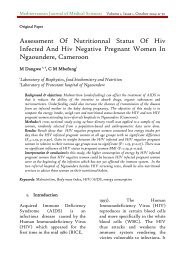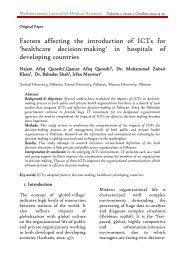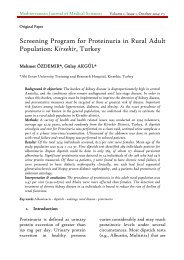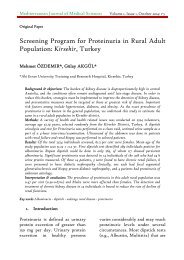Issues and Prospects of e-health in Pakistan
Background & objectives: In connection with access to information in developing countries, information flows through existing networks of communication is a main theme in the current IS literature . Methods:Information-intensive infrastructure is a requirement for information dissemination due to the shortage of network infrastructure in the majority of developing states. It is verified by many researchers that information managing technologies with their main purpose of ‘handling information’ have the advantage to enhance already existing technologies by making better information-communication a priori to new ICT innovations .Presently health information system infrastructure is deficient in resources to meet the demands and needs of increasing population in developing countries. Health care systems of developing countries have major barriers like poverty and lack of technological sophistication. Results:The basic difficulties or barriers in using information technologies include poor or inadequate infrastructure, insufficient access to the hardware and inadequate or poor resources allocation. By eliminating these barriers population health status can be improved in developing countries. Interpretation & conclusion: This study aims to determine the main issues and prospects for ehealth in the current situation of developing countries like Pakistan and the way forward for policy makers to manage all issues in future for more effective and rational decision-making in healthcare organizations. Key words: e-health; challenges; prospects; developing countries; Pakistan
Background & objectives: In connection with access to information in developing countries,
information flows through existing networks of communication is a main theme in the current
IS literature .
Methods:Information-intensive infrastructure is a requirement for information dissemination
due to the shortage of network infrastructure in the majority of developing states. It is
verified by many researchers that information managing technologies with their main purpose
of ‘handling information’ have the advantage to enhance already existing technologies by
making better information-communication a priori to new ICT innovations .Presently health
information system infrastructure is deficient in resources to meet the demands and needs of
increasing population in developing countries. Health care systems of developing countries
have major barriers like poverty and lack of technological sophistication.
Results:The basic difficulties or barriers in using information technologies include poor or
inadequate infrastructure, insufficient access to the hardware and inadequate or poor
resources allocation. By eliminating these barriers population health status can be improved in
developing countries.
Interpretation & conclusion: This study aims to determine the main issues and prospects for ehealth
in the current situation of developing countries like Pakistan and the way forward for
policy makers to manage all issues in future for more effective and rational decision-making
in healthcare organizations.
Key words: e-health; challenges; prospects; developing countries; Pakistan
You also want an ePaper? Increase the reach of your titles
YUMPU automatically turns print PDFs into web optimized ePapers that Google loves.
Mediterranean Journal <strong>of</strong> Medical Sciences V1, I1 October 2014: 31-52 38<br />
2003; Braa et al.2004; Ch<strong>and</strong>a&<br />
Shaw, 2010).<br />
A number <strong>of</strong> aspects <strong>and</strong> features<br />
have been exposed as the crucial<br />
factors <strong>in</strong> creat<strong>in</strong>g or destroy<strong>in</strong>g<br />
the functions <strong>and</strong> tasks <strong>of</strong> e-<br />
Health system everywhere.<br />
Though, the research <strong>in</strong>dicates<br />
that ‘top-management-support’<br />
<strong>and</strong> ‘government-ePolicies’ play<br />
lead<strong>in</strong>g role <strong>in</strong> all the matters<br />
concern<strong>in</strong>g to the plann<strong>in</strong>g,<br />
development, adoption <strong>and</strong> use <strong>of</strong><br />
new e<strong>health</strong> systems along with<br />
their ma<strong>in</strong>tenance on cont<strong>in</strong>ual<br />
basis(Scott et al., 2002). This<br />
becomes extremely important <strong>in</strong><br />
case <strong>of</strong> the develop<strong>in</strong>g countries<br />
like <strong>Pakistan</strong>. The develop<strong>in</strong>g<br />
nations have extra issues <strong>of</strong><br />
‘digital-literacy’ <strong>of</strong> all the<br />
government authorities,<br />
developers <strong>of</strong> the systems <strong>and</strong><br />
def<strong>in</strong>itely the future users <strong>of</strong><br />
e<strong>health</strong> applications (Lang &<br />
Mertes, 2011).<br />
It is not just the will<strong>in</strong>gness <strong>and</strong><br />
acceptability <strong>of</strong> the all the<br />
expected users <strong>in</strong> an organization<br />
which controls <strong>and</strong> decides the<br />
success <strong>and</strong> failure <strong>of</strong> the e-Health<br />
<strong>in</strong>itiatives rather it also conta<strong>in</strong>s<br />
the approach <strong>and</strong> stance <strong>of</strong><br />
government (external authority)<br />
as well as the top management <strong>of</strong><br />
the organization (<strong>in</strong>ternal<br />
executives) (Kimaro &<br />
Nhampossa,2007). Keep<strong>in</strong>g <strong>in</strong><br />
view the specified responsibility<br />
<strong>and</strong> function <strong>of</strong> top management,<br />
it is not unexpected that the<br />
<strong>in</strong>terest <strong>and</strong> support <strong>of</strong> the<br />
executives <strong>in</strong> an organization has<br />
been one <strong>of</strong> the most generally<br />
talked-about organizational<br />
factors for the successful<br />
implementation <strong>of</strong> eHealth<br />
projects (Husse<strong>in</strong> et al., 2007).A<br />
lot <strong>of</strong> studies on the role <strong>of</strong> top<br />
management support for the<br />
success <strong>of</strong> e-<strong>health</strong> systems have<br />
been conducted (Sajjad et al., 2009;<br />
Qaisar & Khan, 2010).<br />
E-Health policy is fastened with<br />
the availability <strong>of</strong> resources along<br />
with the pr<strong>of</strong>essionalism is needed<br />
for the proper utilization <strong>of</strong> the<br />
resources, implement<strong>in</strong>g plans<br />
<strong>and</strong> receiv<strong>in</strong>g the results. Lack <strong>of</strong><br />
pr<strong>of</strong>essional frame <strong>of</strong> m<strong>in</strong>d <strong>and</strong><br />
the attitude is apparently the<br />
bigger concern <strong>and</strong> matter for<br />
those develop<strong>in</strong>g states which<br />
have the resources (Scott et al.,<br />
2005).Government eHealth<br />
policies make an environment<br />
where the likelihood <strong>of</strong> us<strong>in</strong>g<br />
resources effectively is <strong>in</strong>creased,<br />
the pr<strong>of</strong>essionals f<strong>in</strong>d their<br />
suitable places <strong>and</strong> exercise<br />
faithfully <strong>and</strong> the future <strong>of</strong> ITapplication<br />
<strong>in</strong> <strong>health</strong>care becomes<br />
clearly identifiable (Shaqrah,<br />
2010).<br />
In spite <strong>of</strong> the abilities <strong>and</strong><br />
benefits <strong>of</strong> e-Health <strong>and</strong><br />
©2014 Mediterranean Center <strong>of</strong> Medical Sciences








